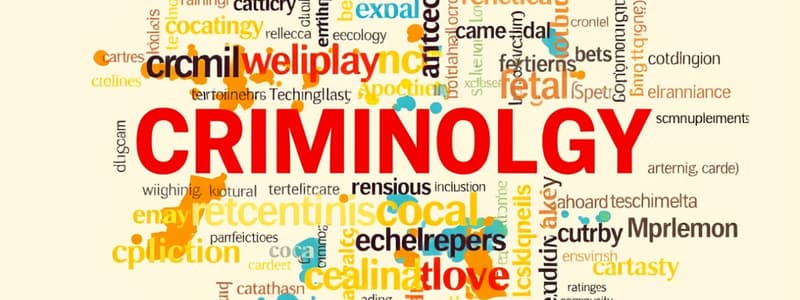Podcast
Questions and Answers
The term ______ refers to the body of facts that show that a crime has been committed.
The term ______ refers to the body of facts that show that a crime has been committed.
Corpus Delicti
A ______ is someone or something responsible for harm or wrongdoing.
A ______ is someone or something responsible for harm or wrongdoing.
culprit
To ______ means to give evidence for something.
To ______ means to give evidence for something.
corroborate
The young offender is referred to as a ______.
The young offender is referred to as a ______.
Information that is heard from other people is known as ______.
Information that is heard from other people is known as ______.
The act of ______ refers to the fraudulent appropriation of funds or property.
The act of ______ refers to the fraudulent appropriation of funds or property.
An ______ is characterized by a state of violent mental agitation.
An ______ is characterized by a state of violent mental agitation.
A ______ is a person who is running away or hiding from the police.
A ______ is a person who is running away or hiding from the police.
Flashcards are hidden until you start studying
Study Notes
Specialized Vocabulary in Criminology
- Corpus Delicti: Body of facts establishing that a crime has occurred, including physical evidence like corpses.
- Corroborate: Providing supporting evidence to substantiate a claim or fact.
- Counterfeit: Imitation of something, typically with intent to deceive; lacks authenticity.
- Culprit: Individual or entity accountable for wrongdoing or harm.
- Curfew: Regulation mandating that activities cease after a specified time.
- Delinquent: A minor who commits an illegal act; often used to describe youthful offenders.
- Deterrent: Factor that discourages actions or behavior, not material in nature.
- Disheveled: Untidy or disorderly appearance, lacking organization.
- Disorderly: Characterized by a lack of logical or regular structure.
- Disturbance: Disruption caused by malfunctioning activity or interruptions.
- Embezzlement: Theft or misappropriation of funds or property entrusted to one's care.
- Erratic: Subject to sudden and unpredictable changes in behavior or actions.
- Exhaust: To tire out completely; can refer to resources or individuals.
- Fact: Proven information established through observation or investigation.
- Farthest: Indicates utmost remoteness in terms of space, time, or sequence.
- Felonious: Associated with serious crimes; having a criminal nature.
- Fondle: To touch or caress gently, often in a loving or affectionate manner.
- Forcible: Involving physical pressure, especially against resistance.
- Fugitive: Individual evading law enforcement or fleeing from danger.
- Handicapped: Impaired ability to function due to illness or injury.
- Harassed: Subjected to persistent trouble or petty annoyances.
- Hearsay: Information received from others that is not directly observed or verified.
- Homicide: Act of one human being killing another, delineating it as a legal definition of murder.
- Hysterical: Displaying uncontrollable emotional agitation or panic.
- Illicit: Actions or behaviors that defy accepted moral standards or societal norms.
- Indictment: Formal charge or accusation of a crime.
- Innocence: State of being free from guilt or moral wrongdoing.
- Interfering: Acting intrusively, meddling in situations or affairs.
- Interrogation: Process of questioning individuals to gather information or evidence.
- Irrational: Lacking reason or logic; inconsistent with rational thought.
- Jargon: Specialized terminology associated with specific groups, professions, or cultures; often obscure to outsiders.
Studying That Suits You
Use AI to generate personalized quizzes and flashcards to suit your learning preferences.




